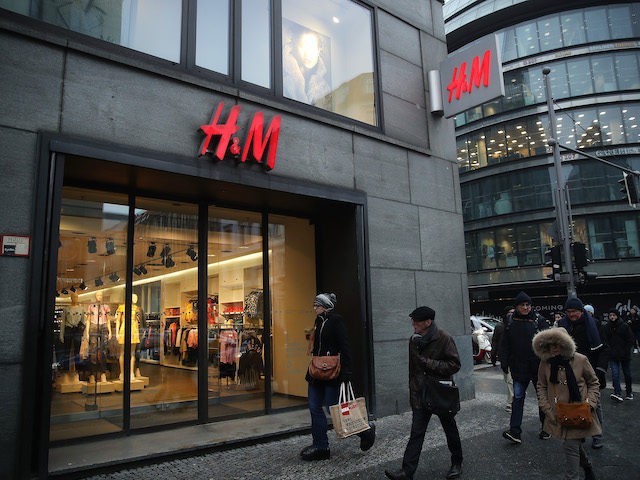The Chinese Communist Party (CCP) renewed its sharp-power attack on Swedish apparel firm H&M on Wednesday after the clothier restated its vow to avoid using cotton harvested by Uyghur Muslim slaves in Xinjiang province.
The CCP launched a sudden blitzkrieg of social media criticism and boycott threats last week against foreign companies that have spoken out against forced labor in Xinjiang or pledged not to buy products made by China’s Uyghur slaves, especially cotton. China is a major supplier of cotton to the worldwide apparel industry and Xinjiang provides 84 percent of China’s cotton.
These attacks on foreign companies were accompanied by Chinese celebrities making a nationalist push for “patriotic pride” in Xinjiang cotton, reaching the depths of grotesque absurdity on Tuesday when fashion designer Zhou Li flounced on stage at a Beijing fashion show with a bouquet of cotton, shaped like a romantic bouquet of flowers, and declared “Xinjiang cotton is my love.”
The initial target of the Chinese propaganda assault, H&M, initially seemed rattled by the onslaught, protesting on the Chinese social media platform Weibo that it buys “sustainable cotton” through a “globally certified third party” – implying the company had nothing to do with refusing to buy cotton harvested with forced labor – and insisting it “respects Chinese consumers.”
On Wednesday, H&M posted a new statement restating its affection for Chinese customers and its intention to continue doing business with Chinese partners, but gently insisting it wishes to be a “responsible buyer, in China and elsewhere,” so it is “building forward-looking strategies and actively working on next steps with regards to material sourcing.”
“We are dedicated to regaining the trust and confidence of our customers, colleagues, and business partners in China. By working together with stakeholders and partners, we believe we can take steps in our joint efforts to develop the fashion industry, as well as serve our customers and act in a respectful way,” the Swedish company concluded, bowing to the pressure from Chinese social media and blaming itself for its public relations problems in the Chinese market.
China’s state-run Global Times jeered on Wednesday that Chinese consumers are “not buying a fresh statement that H&M made on Wednesday” and promised more sharp power will be aimed at the company until it declares Xinjiang cotton its sweetheart too:
Market watchers warned that such a statement could hardly win the forgiveness of Chinese people, and the group may face more stores being shut down in the coming days due to lost consumers.
“Just shut up. H&M does not understand the true thinking of Chinese consumers at all,” a Beijing-based white-collar worker surnamed Liang told the Global Times. “The company lives in prejudice.”
“Lots of nonsense, the statement does not have one sentence saying H&M will support Xinjiang cotton.” “There is no apology? I will continue to boycott the brand,” were some comments by netizens. CCTV.com commented that such a statement is full of empty words and lacks sincerity. “If you really want to regain trust and keep the market, you have to show sincerity on the key issues that you are stirring up,” it said.
The Global Times noted with satisfaction H&M reported pretax losses on its latest financial statement, implying its travails in China – its fourth-largest market after Germany, Britain, and the United States – were a factor in its declining profits.
Adding insult to injury, the governor of Xinjiang accused H&M of “politicizing business matters” and warned other companies not to make the same mistake.
“Caught between calls for patriotism among Chinese consumers and campaigns for conscientious sourcing of cotton in the West, some other companies, including Inditex, the owner of the fast-fashion giant Zara, quietly removed statements on forced labor from their websites,” the New York Times reported on Wednesday.
As for H&M, chief executive Helena Helmersson restated the company’s “long-term commitment” to the Chinese market during the quarterly earnings conference call, and predicted the brutal Communist tyranny will continue to “play an important role in further developing the entire industry.” Other H&M executives said about 20 of the company’s 520 stores in China have been closed by boycotts, protests, or landlords shutting them down.
The Wall Street Journal on Wednesday reported Chinese propaganda officials are “quietly celebrating” the success of their assault on Western apparel companies, comparing the effort to Beijing’s success at crushing democracy in Hong Kong.

COMMENTS
Please let us know if you're having issues with commenting.